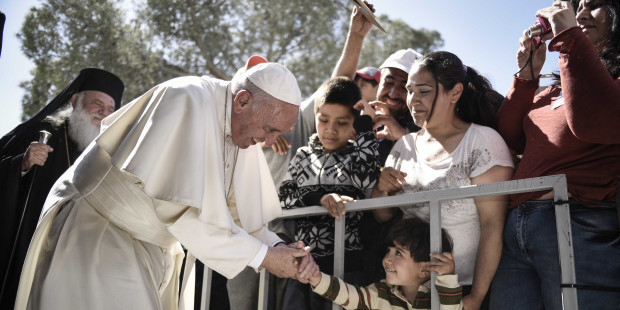When God gives a gift, it is irrevocable: He does not give something one day, and take it away the next. Pope Francis began his homily with this reflection, inspired by the theme of our “election by God,” God’s choice of each of us, which is taken from the day’s reading from the Letter of St. Paul to the Romans.
In the history of salvation, the pope said, there are three “gifts and calls of God to His people”: “the gift of election, of the promise, and of the covenant.” All are irrevocable, because God is faithful. This was the case for Abraham, and it is true for all of us as well:
“Each one of us is elect, chosen by God. Each one of us bears a promise that the Lord has made: ‘Walk in my presence, be irreproachable, and I will do this for you.’ And each one of us makes some covenant with the Lord. You can do it, you can’t will it – it is free. But this is a fact. And also, there must be a question: How do I experience ‘election’? Or do I consider myself a Christian ‘by accident’ [Italian: ‘per caso’]? How do I live the promise, a promise of salvation of my path, and how am I faithful to the covenant? Like He is faithful?”
Then, in the face of the constant “faithfulness” of God, it remains for us to ask ourselves: Do we feel His “caress,” His care for us, and His “seeking after” us when we have distanced ourselves from Him?
And yet, Pope Francis continued, St. Paul, when speaking about the “election of God” returns again and again to two words: “disobedience” and “mercy.” Where there is one, there is the other, and this is our path of salvation:
“That is to say that on the path of election, to the promise, and the covenant, there will be sins, there will be disobedience, but in the face of this disobedience there is always mercy. It is like the dynamic of our walking, journeying toward maturity: there is always mercy, because He is faithful, He never revokes His gifts. It is linked; this is linked, that the gifts are irrevocable; [but] why? Because in the face of our weaknesses, our sins, there is always mercy. And when Paul comes to this reflection, he goes one step further: but not in explanation for us, but of adoration.”
In the face of “this mystery of disobedience and mercy that sets us free,” there is adoration and silent praise. And in the face of “this beauty of irrevocable gifts such as election, the promise, and the covenant,” the pope made this final invitation:
“I think it would do us good, all of us, to think today about our election; about the promises that the Lord has made to us; and about how I live out the covenant with the Lord. And how I allow myself – permit me the word – to receive mercy from the Lord [Italian: ‘misericordiare’ dal Signore] in the face of my sins, of my disobedience. And finally, whether I am capable – like Paul – of praising the Lord for what He has given to me, to each one of us: to offer praise, and to make that act of adoration. But never forgetting: the gifts and the call of God are irrevocable.”

